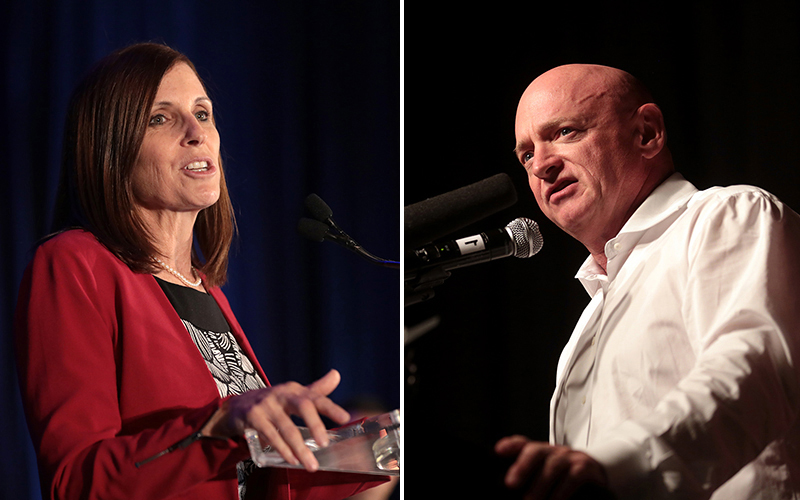
By Ellie Borst and Farah Eltohamy
Rep. David Schweikert has admitted to 11 counts of campaign finance violations, misuse of congressional office funds and pressuring legislative staff to do campaign work, the House Ethics Committee said Thursday.
The Fountain Hills Republican faces reprimand by the full House and has agreed to pay a $50,000 fine in the matter as part of a settlement in which he admitted to the 11 counts and agreed to waive further appeals, the committee’s 103-page report said.
The announcement closes an almost three-year investigation into charges that Schweikert “violated House Rules, the Code of Ethics for Government Service, federal laws and other applicable standards.” The probe included interviews with 18 individuals, including Schweikert, and more than 200,000 documents.
Schweikert has previously said that he welcomed the investigation of what he has said were largely clerical oversights, and a spokesperson said Thursday that the five-term congressman is ready to put the issue behind him.
“We are pleased the Committee has issued their report and we can move forward from this chapter. As noted in the review, all issues have been resolved and Congressman Schweikert will continue working hard for Arizona’s 6th District,” the statement from his office said.
But Democrats were not about to let the issue drop. Four Democrats will face off in next week’s primary for the opportunity to challenge Schweikert in a little more than three months.
Hiral Tipirneni said in a statement Schweikert “has put his own interests above those of his constituents time and time again.”

“Rep. Schweikert has violated his oath, abused his power, lied and misled, and betrayed the public trust with his admission of breaking federal law and ethics rules,” said Tipirneni.
In its report, the Ethics Committee said the violations it cited “are serious and occurred on a continuous and prolonged basis.”
Those included charges that Schweikert’s congressional campaign committee over a period of years claimed to have received loans it never got, falsely reported payments and delayed reimbursements to make it appear his campaign account had more money, what the report called “flagrant and egregious violations of campaign finance law.”
In a 33-page statement of alleged violations, committee investigators also said congressional staffers made campaign purchases, with former Schweikert Chief of Staff Oliver Schwab making purchases of more than $270,000 on behalf of the campaign. Those expenses were reimbursed a variety of ways – including to a consulting company run by Schwab whose only client was Schweikert.
The report said congressional staff occasionally paid Schweikert’s personal expenses “ranging from hundreds of dollars in babysitting services, to food that was kept in the Congressional office” and eaten by Schweikert for everyday meals. Some of those expenses were reimbursed by Schweikert and others were reimbursed by the campaign.
Congressional office funds were used to pay for Schwab’s travel to Phoenix for what included campaign and personal events, and congressional staff occasionally performed campaign work on government time, the report said. While Schweikert claimed he was not aware of the work, one staffer was quoted in the report as saying “it would take willful ignorance and negligence” for him not to have known.
In a reply to the report, Schweikert said it includes “a number of assertions, findings, and unfounded speculative statements … that would be proven false or misleading if subjected to the scrutiny of a full adjudicatory process.” He said he agreed to the settlement to put the issue behind him and to end the financial drain, at one point referencing “hundreds of thousands of dollars on investigative costs.”
Schweikert agreed he was ultimately responsible for the actions of his congressional and campaign staffers, but then tried to pin much of the blame on Schwab, saying investigators had “significant reasons to doubt his overall truthfulness.” He said Schwab, whom he considered a family friend, was guilty of “a devastating breach of professional and personal trust.”
But the committee said that while Schweikert “sought to lay much of the blame at the feet of Mr. Schwab,” it was ultimately his responsibility to police the office.
The report noted that Schweikert has instituted new safeguards in his office and that he made “substantial efforts to cooperate” in the investigation, but that the information was often slow in coming. He “made vague or misleading statements … that allowed him to evade the statute of limitations for the most egregious violations of campaign finance laws … and gave self-serving testimony that lacked candor.”

“Representative Schweikert endeavored to keep his head in the sand through most of the … investigation, rather than approach the matter with the level of diligence and candor that he should have,” the report said, citing his repeated assertions that he is a “good guy” who was taken advantage of.
Schweikert’s troubles have given hope to Democrats, although his district is still considered to be leaning Republican.
It does appear to have hampered his fundraising. He had raised $1.3 million and had $230,000 in the bank as of June 30, according to his most recent filing with the Federal Election Commission. Tipirneni, by contrast, reported raising almost $2.5 million as of June 30, with nearly $1.3 million in cash on hand.
Anita Malik, another Democrat running to unseat Schweikert, said Thursday’s report shows it is time for him to be held accountable. But she called it unfortunate that it came to the point where he had to be reprimanded and fined by the House.
“I think he’s getting away with something and it’s unfortunate that we’re seeing this come out of Congress, this should not be a standard I think we should set,” Malik said. “Admission of guilt – to me – is not enough. He brought shame to this district and I think it’s time to resign.”
A reprimand is a less serious penalty than censure of a House member, in which the lawmaker stands in the well of the House while the charges against him are read. The reprimand can be adopted without the member being present and does not carry other penalties unless specified otherwise.
Arizona Democratic Party spokesman Matt Grodsky said he thinks voters have been “fed up with Schweikert’s tactics for a while” and that Thursday’s report makes their choice clear this fall.
“$50,000 is a start – but justice will be served when we vote this guy out on Nov. 3rd,” Grodsky said.
Updated July 31 6:07 a.m.

